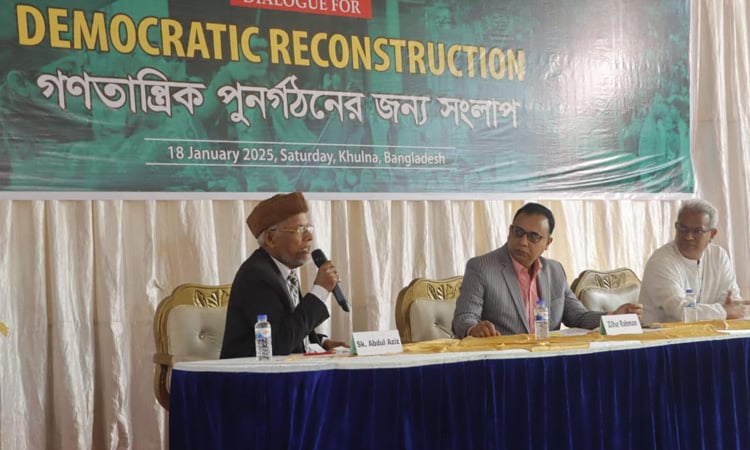News Flash
News Flash

KHULNA, Jan 18, 2025 (BSS)- The Centre for Governance Studies (CGS) has initiated a series of dialogues across all divisions, including Dhaka, to address priority reforms essential for building a democratic state.
As part of this initiative, a program titled "Dialogue for Democratic Reconstruction" was held at the Khulna Press Club today.
Participants at the event emphasized the need for swift reforms and timely elections.
Vice-Chancellor of KUET Professor Dr. Muhammad Masud, and Former President of Khulna District Bar Association SK Abdul Aziz were the guest speakers in the dialogue.
Zillur Rahman, Executive Director of CGS moderated the event while teachers, students, lawyers, politicians, industrial entrepreneurs, civil society members, media professionals, activists, small business owners, women entrepreneurs, volunteers, and professionals from various sectors provided valuable insights on reform during the event.
Professor Dr Muhammad Masud said, “There is a common notion that one autocracy inevitably leads to another. I disagree with this. We have already seen positive changes, and they must continue. Urgent reforms are required in the judiciary and electoral systems, followed by national elections.”
Sheikh Abdul Aziz stated that “Autocratic governments often create self-serving laws to protect their interests. We must escape this cycle and ensure proper enforcement of existing laws.”
Zillur Rahman highlighted, “To build a democratic state, everyone must have the freedom to express their views. The consequences of silencing voices were evident on August 5. Now, there is a strong public desire for change and national reconstruction, which must be harnessed positively.”
BNP Information Secretary Azizul Bari Helal emphasized the party’s 31-point proposal for national reconstruction. He stated that the proposal is dynamic and will adapt to national needs as necessary.
Helal criticized the inclusion of "pluralism" in the Constitution, asserting that "Bangladeshi nationalism" already encompasses all communities. He further commented on the recommendation to mandate 10 percent youth participation in elections, calling it impractical.
Representatives from various sectors expressed their views on reform.
A participant from the anti-discrimination movement called for drafting a new Constitution to replace the 1972 version and reconstruct Bangladesh based on the principles of 1924.
A women entrepreneur stressed the importance of ensuring women are not sidelined during reforms, highlighting their significant progress.
A representative of marginalized communities argued that sustainable reforms require prioritizing their rights and ensuring their participation.
The representative of the Islamic student movement called for proportional representation in elections to ensure effective parliamentary representation.
A representative of Bangladesh Jamaat-e-Islami urged a strong foreign policy, freedom of expression, and constitutional reforms that empower the people rather than the ruling elite.